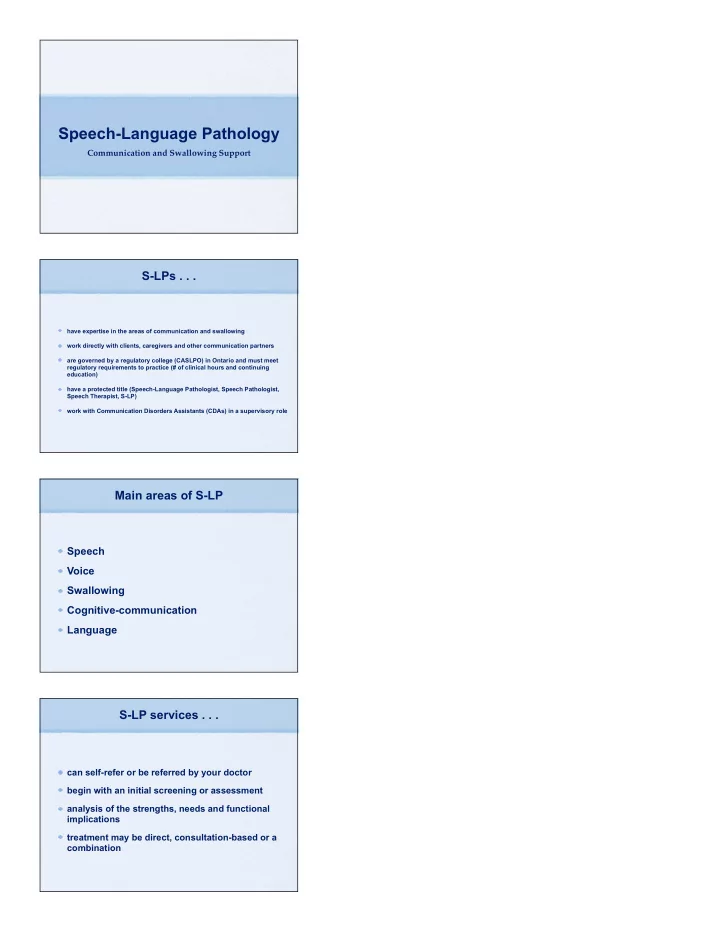

Speech-Language Pathology Communication and Swallowing Support S-LPs . . . have expertise in the areas of communication and swallowing work directly with clients, caregivers and other communication partners are governed by a regulatory college (CASLPO) in Ontario and must meet regulatory requirements to practice (# of clinical hours and continuing education) have a protected title (Speech-Language Pathologist, Speech Pathologist, Speech Therapist, S-LP) work with Communication Disorders Assistants (CDAs) in a supervisory role Main areas of S-LP Speech Voice Swallowing Cognitive-communication Language S-LP services . . . can self-refer or be referred by your doctor begin with an initial screening or assessment analysis of the strengths, needs and functional implications treatment may be direct, consultation-based or a combination
Speech-Language Pathology and Parkinson’s Disease Why is communication important? We are social beings When our ability to communicate changes it disrupts: our definition of ourselves our connection to the world Can lead to feelings of frustration, isolation, loss of control and even depression Who can benefit? speech therapy can be beneficial at all stages of PD new evidence suggests “the earlier the better” slow the progression of the disease through the mechanism of neuroplasticity (brain reorganization) to be aware of and identify changes in communication and swallowing train family and caregivers to support through all stages put environmental modifications or assistive devices (technology) in place
What kind of therapy is helpful? tailored to the individual monitoring vs. direct therapy vs. consultation working with the same clinician over time can be beneficial Swallowing Socializing while eating can be difficult and potentially unsafe If you or your family notice any of the following symptoms during mealtimes - referral should be made to a S-LP What is really going on? swallowing is a very complex movement tendency to regularly swallow slows down rocking-rolling motion of the tongue muscle strength of swallow is reduced you may not be aware of your swallowing difficulties
Assessment and treatment must be done by a qualified professional clinical assessment x-ray may be needed to visualize the swallow to guide treatment recommendations IF exercises would be helpful, must be tailored to specific difficulty What can you do? Focus during mealtimes Concentrate on an effortful swallow Make diet modifications (in consultation with a S-LP) Sit with good posture Take smaller bites without rushing Interesting news out of London Health Sciences chewing gum for 30 minutes before eating to improve saliva management and swallowing allows for improved function for 30 minutes after finishing chewing gum gums acts as a sensory cue to improve sensory motor memory not for individuals who a) are bedridden and b) for whom choking is a concern
Speech and Voice Parkinson’s disease can reduce your ability to be understood Sensory-perceptual deficits - you may not be aware to what extent your speech and voice have changed 89% of people with PD have disordered speech (Logemann et al, 1978) 4% receive speech treatment (Mutch et al, 1986, Hartelius & Sveenson, 1994) You may experience . . . quiet voice hoarse and breathy voice quality imprecise speech difficulty controlling speech rate speech lacks emotional tone hard to initiate speech Assessment may include . . . history-taking oral mechanism examination speech tasks (such as oral reading) voice tasks (such as phonation) **referral from an ENT is required for voice
Treatment tailored to the individual - needs and strengths must support client’s goals and fit client’s communication environment exercises - e.g. lips, tongue, sound-based, pacing strategies - used by client or by communication partner assistive devices Lee Silverman Voice Treatment evidenced-based treatment - “gold standard” randomized controlled trial goal is use of louder voice automatically in daily communication and long-term carryover set protocol of 4 days per week for 4 weeks short, intense, high effort therapy Think Loud! What can you do? modify the environment to make communication as easy and effortless as possible introduce your topic maximize the hearing of frequent communication partners take breaths often while speaking exaggerate your speech movements
Cognition altered language skills difficulty understanding non-verbal cues slowness of thought (bradyphrenia) may result in a delayed and sometimes confused response in conversation Intervention for cognition involves . . . Training client and communication partners to: choose best time to communicate reduce distractions speak slowly and clearly with short, simple phrases ask yes/no questions S-LPs can tailor strategies that capitalize on remaining function and teach more natural and fulfilling conversation Assistive technology Technology in action Tim Horton’s example must be tailored to the person and their communication environment
Commitment for therapy: Time given the individuality of people with PD, treatment must also be individualized swallowing: mainly environment management - typically see some results after a few sessions and able to move to monitoring more quickly speech and voice: dependent on severity, support for practice and goals - ++ variability in treatment amount and frequency Commitment for therapy: Financial limited publicly-funded programs in Durham Region, mainly focused on swallowing private S-LP rates: $120 to $180 per hour private services may be funded by extended health insurance plans, personal payment and occasionally through the support of community charities/agencies (quite variable throughout the province and even within Durham Region) Collaboration is key! Individuals affected by PD and S-LPs working together to better meet the needs of the community in Durham Region To discuss your specific needs: 905-723-3061 speech@beyondslp.ca
Recommend
More recommend